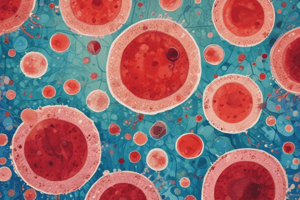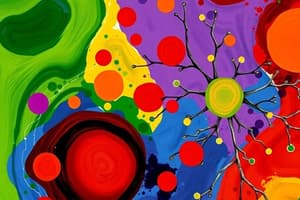Podcast
Questions and Answers
What is immunochemistry?
What is immunochemistry?
A specialized field focusing on the chemistry of the immune system.
Which of the following are key components studied in immunochemistry? (Select all that apply)
Which of the following are key components studied in immunochemistry? (Select all that apply)
- Mitochondria
- Antibodies (correct)
- Nucleotides
- Cytokines (correct)
Antigens can only be proteins.
Antigens can only be proteins.
False (B)
What role do cytokines play in the immune system?
What role do cytokines play in the immune system?
The technique used for detecting specific proteins in a sample is called _____ .
The technique used for detecting specific proteins in a sample is called _____ .
What is the primary application of immunochemistry in medical diagnostics?
What is the primary application of immunochemistry in medical diagnostics?
What are the two main types of immune responses?
What are the two main types of immune responses?
Which types of cells are central players in acquired immunity?
Which types of cells are central players in acquired immunity?
Memory cells enable a slower immune response upon subsequent exposures to an antigen.
Memory cells enable a slower immune response upon subsequent exposures to an antigen.
Match the following techniques with their primary use:
Match the following techniques with their primary use:
Flashcards are hidden until you start studying
Study Notes
Immunochemistry
- Immunochemistry is the field that studies the chemistry of the immune system.
- This field focuses on the chemical components involved in immune responses, including antibodies (immunoglobulins), antigens, cytokines, chemokines, and other related molecules.
- It investigates how these components interact and their roles in both normal immune function and disease processes.
Key Components
- Antibodies/Immunoglobulins: Proteins produced by B cells that specifically bind to antigens, these mark the antigens for destruction via other immune cells.
- Antigens: Substances that provoke an immune response; they can be proteins, polysaccharides, or other molecules found on pathogens or foreign substances. These are essentially the substances the immune system recognises as foreign.
- Cytokines/Chemokines: Signaling proteins that mediate and regulate immunity, inflammation, and hematopoiesis. These proteins carry messages between immune cells and direct them toward immune responses.
- Epitopes: Specific parts of an antigen recognized by antibodies; these are the "handles" on the antigen that antibodies grab onto.
Techniques in Immunochemistry
- Enzyme-Linked Immunosorbent Assay (ELISA): A plate-based assay technique designed for detecting and quantifying proteins, hormones, antibodies, or antigens.
- Immunoblotting (Western Blot): A method used to detect specific proteins in a sample using gel electrophoresis followed by transfer to a membrane and probing with antibodies.
- Immunohistochemistry (IHC): A technique used to visualize the presence and location of specific antigens in tissue sections using labeled antibodies.
- Immunofluorescence: Similar to IHC but uses fluorescently labeled antibodies to detect antigens under a fluorescence microscope.
Applications of Immunochemistry
- Medical Diagnostics: Immunochemical techniques are used to diagnose diseases, such as cancer, by identifying specific markers within tissue samples.
- Research: Immunochemical methods are employed in various studies, helping researchers understand disease mechanisms at a molecular level.
- Therapeutics Development: Understanding how immune components interact with pathogens or diseased cells allows for the development of new drug treatments.
Historical Context
- Svante Arrhenius laid the foundation for immunochemistry with his 1907 publication "Immunochemistry”.
- Early examples of immunochemistry include the Wasserman test for syphilis, a diagnostic test for the bacteria that causes syphilis.
Immune Response
- A complex physiological reaction that occurs within an organism to defend against harmful invaders such as bacteria, viruses, fungi, and other foreign substances.
- The immune system is essential for maintaining health and preventing infections.
Innate Immunity
- The body’s first line of defense against pathogens. It's non-specific and responds quickly to any foreign invader without prior exposure.
- Includes:
- Physical Barriers: Skin and mucous membranes that act as barriers to prevent pathogens from entering the body.
- Cellular Components: White blood cells like neutrophils and macrophages that identify and destroy pathogens.
- Chemical Factors: Proteins and chemicals including cytokines and complement proteins that help mediate the immune response.
- Pattern recognition receptors (PRRs) on immune cells recognize specific structures known as pathogen-associated molecular patterns (PAMPs) when a pathogen breaches the body's barriers.
- This recognition triggers a cascade of immune responses aimed at eliminating the threat.
Acquired Immunity
- Develops over time through exposure to specific antigens, leading to a more sophisticated response.
- Includes:
- Lymphocytes: B cells and T cells are the central players in acquired immunity. B cells produce antibodies that target specific antigens, while T cells directly attack infected or cancerous cells.
- Memory Cells: After an initial exposure, some B and T cells become memory cells. These cells enable a faster and more effective response upon subsequent exposure to the same antigen.
Studying That Suits You
Use AI to generate personalized quizzes and flashcards to suit your learning preferences.




